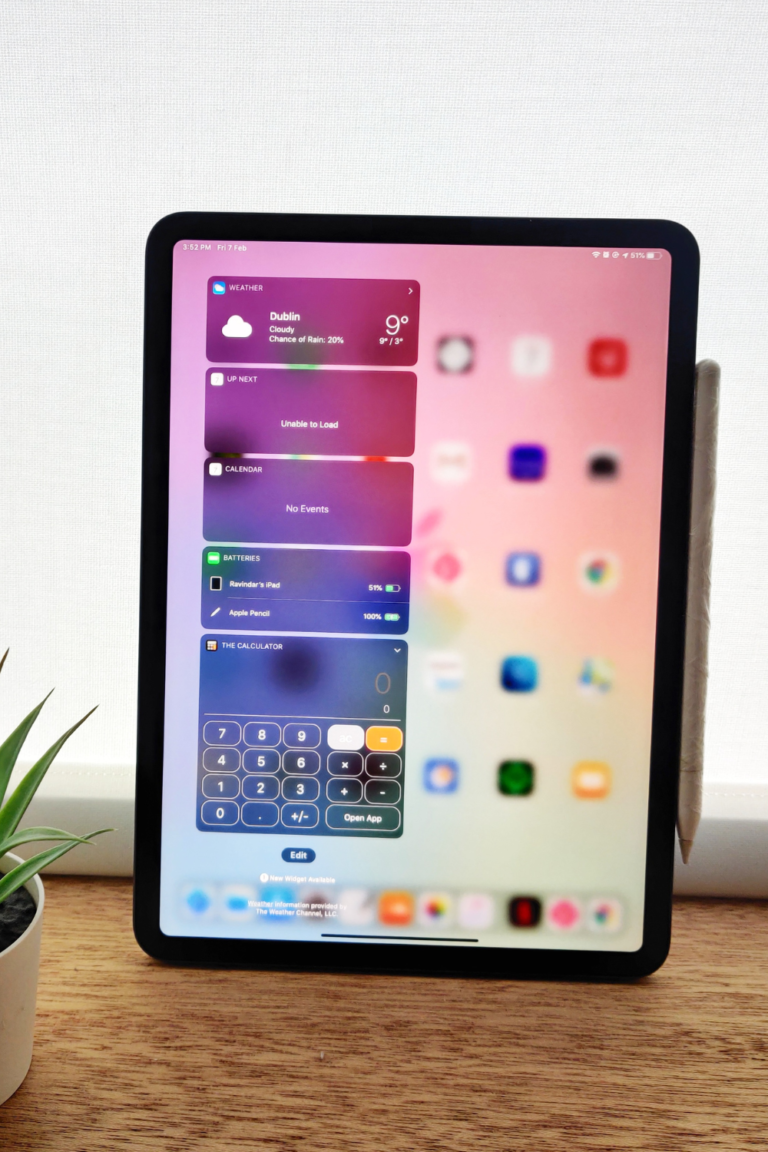Successful Student Habits – Simple Guide | You Need Now (Powerful)
Estimated reading time: 14 minutes
Use these successful student habits to help drive your focus, productive habits, and unique qualities to maximize your ROI.
This post may contain affiliate links, which means I’ll receive a commission if you purchase through my link, at no extra cost to you. Please read full disclosure here.
As an Amazon Affiliate I earn from qualifying purchases.
What Makes A Successful Student and Successful Student Habits?
Successful students are gritty and focused on their end goals. To achieve them they must have discipline, be creative, be organized, and be resourceful. They show enthusiasm and engagement by asking questions and being supportive of others. They have a growth mindset which helps them overcome challenges and learn from them.
There are of course many more qualities, but here is the list of the top qualities of a good student, regardless of age or stage.
Student Habits for Success
- Disciplined regardless of motivation.
- Focused on their goals (their ROI).
- Engaged and always asking questions.
- Enthusiastic about learning.
- Organized with time and workload.
- Growth Mindset to overcome when challenged.
- Resourceful in today’s age of information.
- Supportive of others.
- Creative and open-minded.
- Grit (the #1 predictive factor!).
Take a screenshot or download it if you need a reminder!
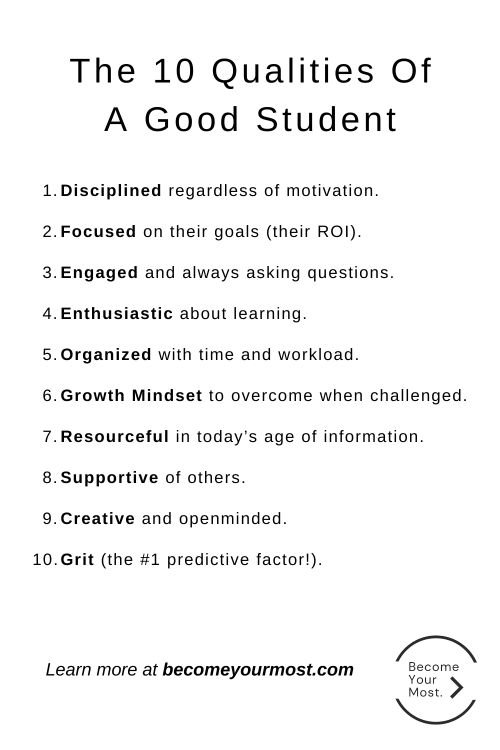
Let’s dig further into the importance of each quality … and how you can apply them to your own life!
DISCIPLINED
What Actually is Discipline? And why it considered one of the successful student habits?
We’ve all been guilty of saying something along the lines of, “I want ___, I just don’t have any motivation”. Ready for the secret?
Motivation is temporary. Discipline will carry through.
Don’t beat yourself up though!
We often compare ourselves to others.
We wonder why people around us get good grades, are star athletes, are talented artists, etc.
What we don’t see is what they really have is discipline in perfecting their skills.
- We don’t see the hours they spend studying
- We don’t see the days they practiced through extreme weather
- We don’t see the cramping of their hands as they practice their craft.
Discipline is something you can learn and takes practice.
Sure, some people are talented or some have a knack for becoming disciplined such as a person who is Type A, but discipline will always win out and that is one of the most critical student habits for success.
FOCUSED
Education is entirely about ROI. Not simply just your ROI as in your debt to income ratio, but rather, did you get out of school what you were looking for.
The difference between successful students and average students is that successful students utilize their goals to drive their focus.
Not to say that you cannot be successful if you go to school without a major or career path in mind.
Many students go into school undecided but with a general plan.
However, because college for most is costly, and ultimately an investment, to maximize your ROI you have essentially two standard choices:
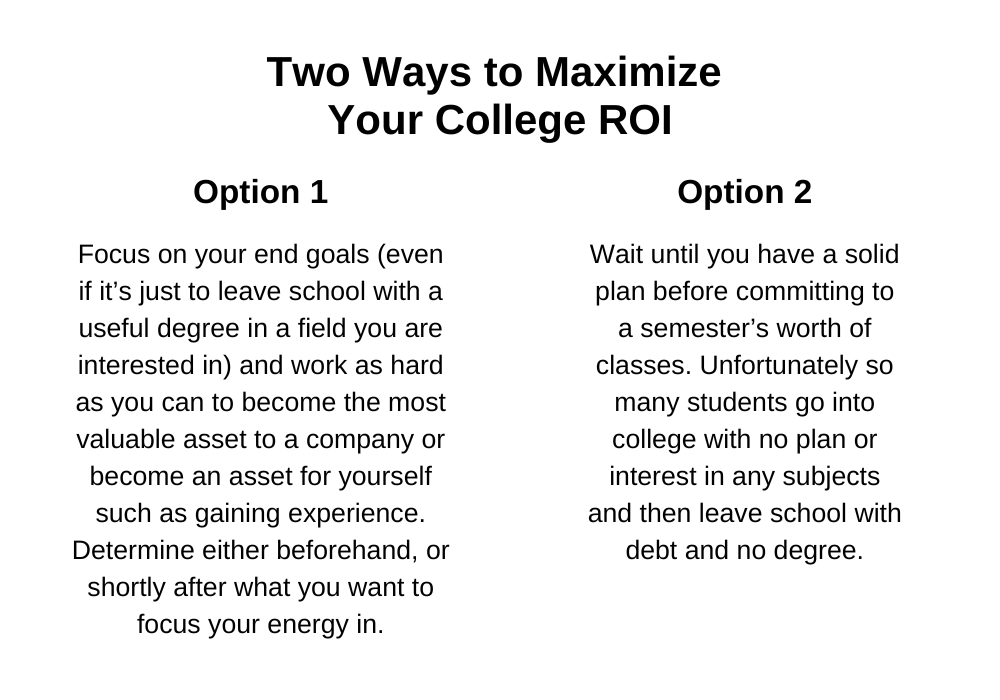
Habit Tracker For Focusing On ROI
ENGAGED
Students who are engaged are way more likely to actually learn and understand what is being taught, rather than memorizing just to pass a class.
Why is “engaged” a student habits for success?
Ultimately, again, because college is an investment, learning the materials is much more effective.
This is where the American school system often gets it wrong. As opposed to countries like Finland that are focused on learning rather than essentially test-prep.
You might be wondering, “So how can I become more engaged? I don’t control the American school system”.
Why is being engaged considered one of the successful student habits?
You must ultimately focus on what you can control.
Not every subject is going to pique your interest … but you never know what might apply later.
One way is to find your personal interest in the mundane — you might not have interest in that architecture gen-ed you reluctantly chose … but you might find interest in real estate investing in the future, and might learn something applicable to your future investments.
ENTHUSIASTIC
The reality is that you might not have an interest in a subject, but you never know when it might come in handy. Learn and absorb everything you can.
👉 Essentially, you need to learn to love learning.
A way to view it is by applying an example.
How would you behave at a dinner party when someone brings up their personal interest?
You might not have an investment in collecting art, for example, but it would be impolite to ignore them or not listen to their interests.
In fact, there is much we can learn when we listen and learn something about something we might not have any knowledge of.
The mistake many fall into is that they roll their eyes or try to discuss how their cousin’s friend’s dog enjoys collecting art (adding a little humor there 😉) to contribute to the conversation (or just speak for speaking’s sake) rather than ask questions and actually learn.
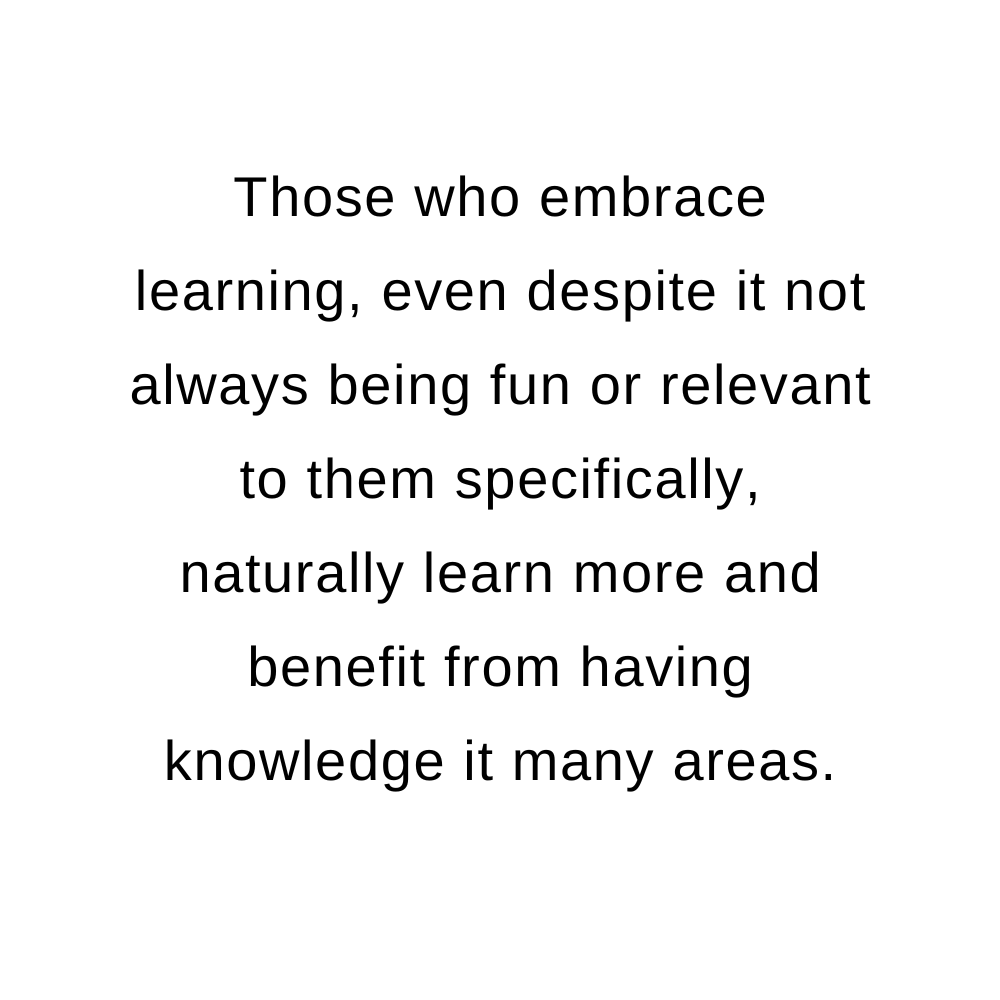
ORGANIZED
This goes almost without saying, but it is surprising how many students are not organized with their time, studying, and materials.
Why is being organized considered one of the student habits for success?
We can save so much time and energy setting up simple systems to stay organized such as keeping an organized planner, organized systems of notes, and sticking to a routine.
Here’s a simplistic system I used in college to help me keep organized notes, that might be helpful to you.
This is what I did …
- Type my notes in class (because that was faster than hand-writing them (plus they were much more legible and was listening in class).
- I would hand-write my notes outside of class, and rewrite them to encourage retention.
- I would create Quizlets and write on flash cards only specific, and useful pieces of information I was struggling with (and didn’t waste time making them for concepts I understood).
- I would use a whiteboard to write, and re-write problems (I had very math-intensive courses) or to draw out mind maps or workflows.
Having a workflow for studying made it so much easier to sit and focus.
Instead of wondering what to do first, I knew where to start.
GROWTH MINDSET
Why is grit considered one of the successful student habits?
A growth Mindset is critical not only for school but for life.
A growth mindset is a state of mind where one is open to change.
This essentially means that one possesses an internal locus of control, rather than a closed mindset where one possesses an external locus of control.
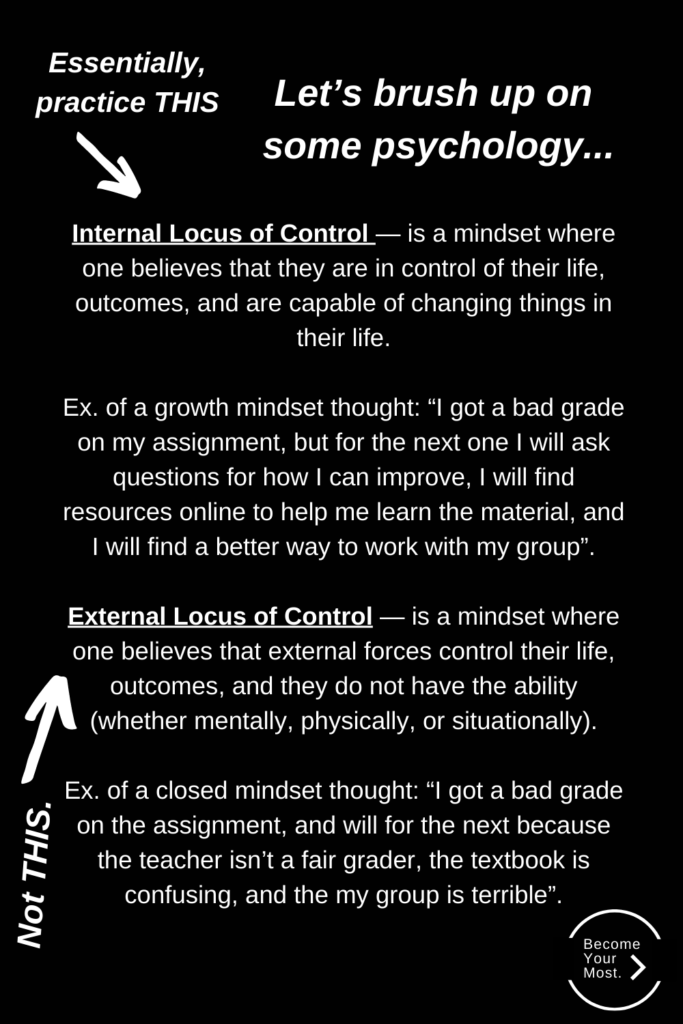
A growth mindset is important because it helps us to cope with failure and focus on what we can control.
… There will always be things that are unfair in life or difficult, and sometimes things truly aren’t in our control, but doing our best to maintain a positive and productive mindset is critical in helping us in school and in life.
Here is a helpful resource that outlines how to practice incorporating growth mindset for students for all situations.
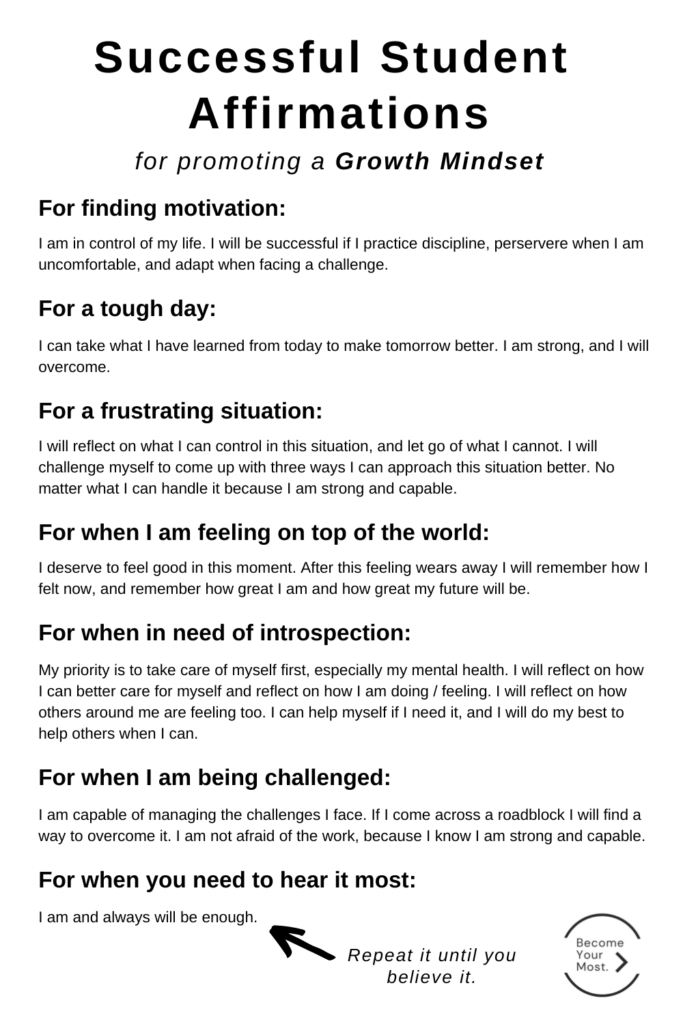
Want to learn more?
RESOURCEFUL
In today’s age of information, it can be completely overwhelming to sort through all the noise to determine what is helpful, useful, credible, etc.
What it comes down to is our ability to find valuable resources.
For example, for news, instead of turning to sources such as social media exclusively, as many do, find credible news sources that are unbiased such as the Associated Press or Reuters.
An example of a valuable source of information, whose reputation is not great, famously because of schools, that is actually very valuable is Wikipedia.
Other valuable sources of information are sources such as Harvard, Google Scholar, and Statista.
Here’s a handy list.
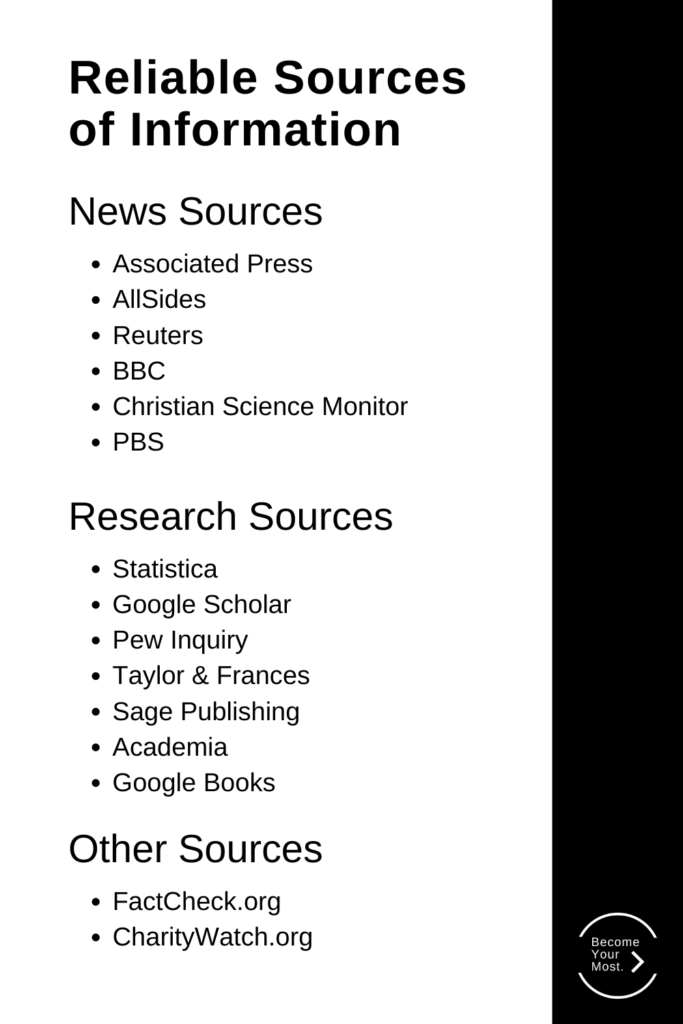
The best way to find valuable information is to take the time to vet sources in advance and not get caught up in the noise online.
We all can find answers, it’s whether those answers can be substantiated.
SUPPORTIVE OF OTHERS
This one seems obvious, but unfortunately is not viewed that way.
In the American education system, and many around the world there is a huge emphasis on competition for accolades, rankings and placements, scholarships and awards, etc.
It often draws the actual focus of many because school is no longer about actually learning, it is about outranking, outperforming, etc. 🙄
Many get so caught up with those around them that they lose focus on what matters, and can even cause emotional and psychological harm to others in the pursuit of success.
Successful students understand that when they win, others around them win and vice versa.
Being a supportive classmate doesn’t mean giving someone the answers or letting them cruise while they do all the work.
A supportive classmate means:
- Being an ally to others and creating a healthy environment.
- Helping others when they need it such as explaining a concept.
- Engagement in the classroom and asking questions.
By helping create a supportive learning environment for others, it also creates that the other way.
When we support others in the classroom we contribute to a learning environment where everyone is equal, including ourselves.
Being a supportive classmate is obviously the right thing to do, and frankly, the bare minimum, as everyone should treat everyone with respect.
But if you’re looking for another benefit to helping others is that by being supportive of others in the classroom, such as sharing notes or reminding others of assignments, they are more likely to reciprocate when you need help.
When we ask questions and are engaged in a classroom, others might feel comfortable enough to do the same, and they might even ask a question that could help you.
CREATIVE
Creativity is the pursuit of trying something new and original…
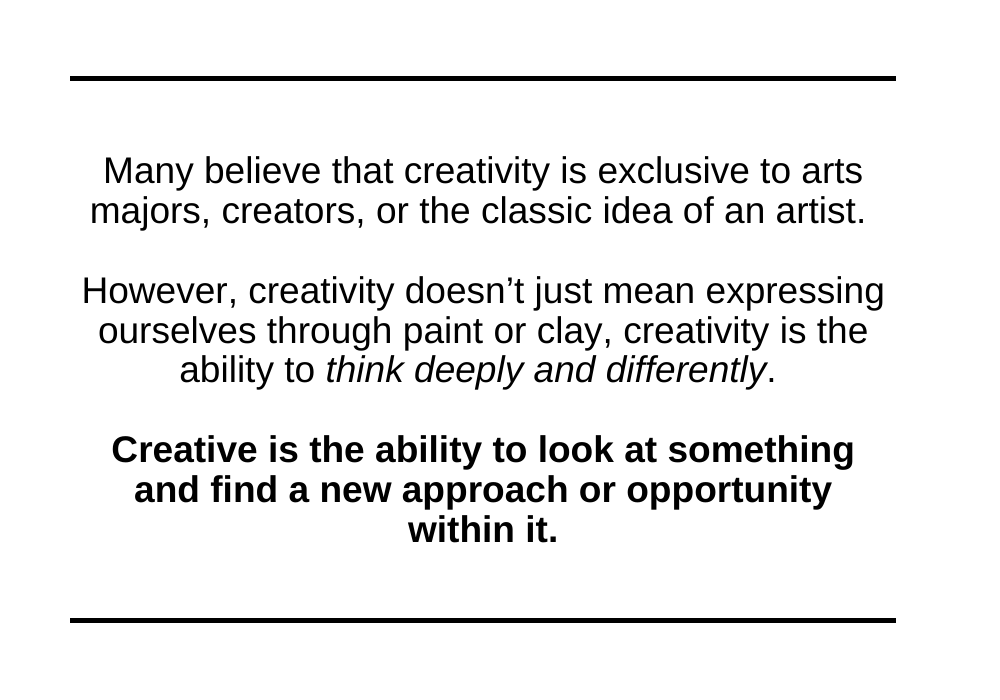
It’s similar to the phrase, “I could never be a salesperson”.
Whether you are selling yourself, such as a job interview, your position such as a new way of doing a task at work, or a product, you are always selling in life.
The same applies to creativity.
Why is being creative considered one of the successful student habits?
- You can be creative in thinking of a new way of sharing your Q4 position to your team by creating a pivot table in Excel.
- You can be creative in discussing how you would style a room differently.
- You can be creative in trying a new way to season your baked veggies with a new ingredient.
It doesn’t need to be coming up with something completely life or world-changing, technologically complex, or a visual masterpiece.
… Sometimes it’s just viewing a business and thinking of ways you could run it better or identifying a gap in the market.
GRIT
Grit is one of the most overlooked factors of all.
So, what is Grit?
Grit is essentially one’s tenacity and passion characterized by a heavy emphasis on one’s beliefs around their abilities.
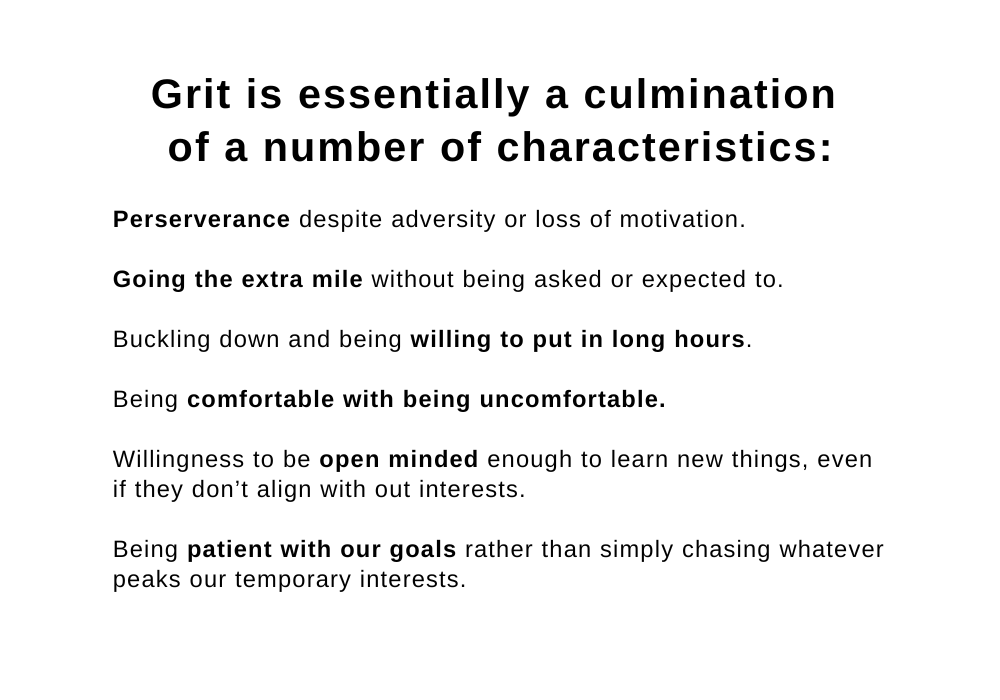
It boils down to three main characteristics:
- Discipline —> Being willing to put in the work.
- Perseverance —> Sticking with it when it gets challenging.
- Adaptiveness —> Changing when things aren’t working.
Here’s an example – successful student habits
Two students, Tiffany and Jon are in a math class together.
Jon is considered a “gifted” student 🏆 because school and learning have always come naturally to him. He rarely studies, yet gets good grades. 💯
Tiffany is considered a slightly above-average student. School has never come easy to her, so to pass she spends hours each night studying. 👩💻
👉 As a result, through hard work and effort, later in life she is very successful because she uses it to and is understanding of the effort involved.
👉 Jon on the other hand is an average worker. He does well but is often lazy and therefore due to his unwillingness to put in the effort, does not see rewards such as pay bumps, higher-level positions, etc.
When he learns of her success he wonders why she is seemingly doing better than him when she was never a gifted student and struggled a lot to earn her grades, unlike him.
He needed to be challenged more, and while her struggle was frustrating it was actually very helpful in the long run.
A Story As Old As Time
Perhaps you have observed this case in your own life.
Maybe you can even identify with Tiffany or Jon. This case is a story seemingly as old as time. It demonstrates the importance of origin and why being taught hard work is so helpful when one is young.
You’ve likely observed this in similar life events, as it is echoed in many stories in TV shows and books.
- The spoiled, rich child who never understands the value of hard work because they have been privileged their whole life, and it comes back to bite them later.
- Someone coming from nothing and becoming something great later on.
We all love a great story, and it can be very satisfying to see essentially “the good guy” win, in this case being someone more deserving.
Life is never fair, and that’s not to say that Jon in the story can’t be more successful than Tiffany.
It is merely an example of someone developing grit.
Why is Grit Important?
Grit is a predictive measure.
It cannot be better summed up than this Ted Talk, by Angela Lee Duckworth discusses the importance of grit, and it being the number one predictor of success.
This is crazy … because one would assume money, grades, or privileges such as access to resources such as computers to elite private schools.
Watch this video, you won’t be disappointed.
How Can I Be Gritty?
As with anything, everyone varies greatly when it comes to their traits.
Some examples include:
- It is highly based on your personality ✨
- Your belief in yourself and your abilities 💪
- Your innate openness and ability to change your mindset 🧠
However, as detailed above, to become more gritty, one must grow the three main characteristics of grit; discipline, perseverance, and adaptiveness.
Here are some great ways to start …
The secret?
It all boils down to practice. (Stay with me)
It will not be easy, but if you become consistent, it will become easier once it becomes a habit.
Pro tip: Don’t do things that will end, or you would like to be temporary such as a diet, as you want this to be something sustainable so that your grit is too.
Discipline
- Sit down for consistently longer periods of time doing “hard work” (essentially things you don’t want to be doing) such as sorting through emails.
- Pick just one habit you would like to change and start consistently tracking how often you are doing it for. I recommend a daily habit, because if it’s weekly or monthly you are more likely to forget. It can be as simple as making your bed every day or getting in 5k steps a day.
Perseverance
- Life can be very hard. On the hardest days it can be even harder to stick to our goals. When you experience a hard day, make a committment to yourself to do things you normally wouldn’t do when you are stressed such as taking care of yourself (Ex. cooking a healthy dinner or going to bed at a reasonable time).
Adaptiveness
- Train your brain. Often when we meet a roadblock, such as someone not doing their share of work which delays your progress we melt down instead of finding constructive ways to adapt to the situation or future situations. Practice asking yourself out-loud, “What can I do differently?”
- You might be extra frustrated because our inital thoughts are typically along the lines of, “Well if so-and-so would do X, Y, and Z, I could ___”.
- It’s not to say that it can’t be entirely their fault, but the important thing to focus on what we can control.
- It can be as simple as preventing this from happening again by kindly asking this person if they need help, making them aware of the situation, or finding new ways to approach this in the future.
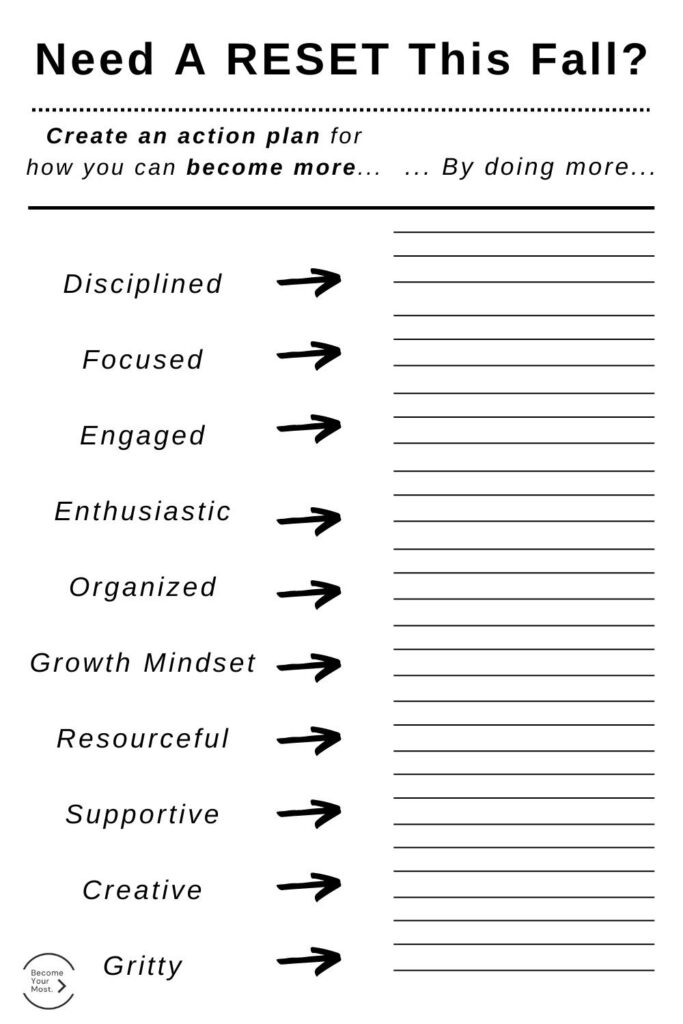
In summation, a successful student possesses many successful student habits that help them become great.
- Disciplined
- Focused
- Engaged
- Enthusiastic
- Organized
- Growth Mindset
- Resourceful
- Supportive
- Creative
- Grit
Working on developing those student habits for success is critical in developing as a person, and making the most of your academic experience.
Sources:
Ng B. The Neuroscience of Growth Mindset and Intrinsic Motivation. Brain Sci. 2018 Jan 26;8(2):20. doi: 10.3390/brainsci8020020. PMID: 29373496; PMCID: PMC5836039.





